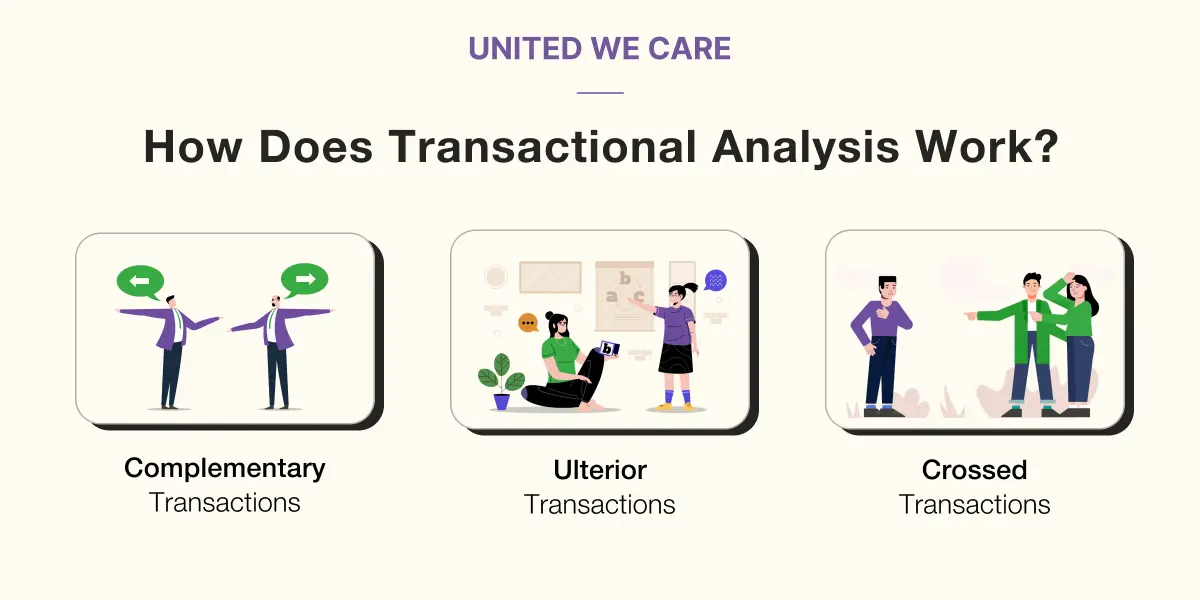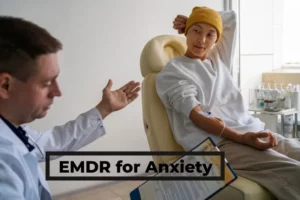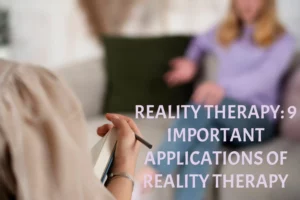Introduction
Essentially, any social interaction you have with another person varies significantly. There are several factors involved. Such as your thoughts, your feelings during the interaction and finally, how your behavior displays them. You need to understand these interactions and associated factors analysis. Therefore, psychologists devised the concept of “Transactional Analysis”.
While transactional analysis was initially developed to understand social interactions alone, there are currently numerous applications of transactional analysis. Let’s learn below how transactional analysis works and how we can benefit from it.
What Is Transactional Analysis?
To be precise, any kind of social communication is a transaction. The sender provides the stimulus of the transaction, and the receiver provides the responses associated with the transaction. Hence, the analysis of these transactions collectively is known as transactional analysis. Eric Berne developed the theory of transactional analysis based on the personality theories of Sigmund Freud.
According to Eric Berne, the ego states of an individual define the type of transaction they will indulge in, and therefore, the transactions are representative of the ego states. These ego states are not similar to the theories of Freud or other popular psychologists. Rather, the ego states in transactional analysis are governed by individuals taking up these roles during a conversation. The three ego states are parent, child and adult.
Parent Ego State
Just as Berne suggested, the parent ego state is based on the learnings of social interaction in the first five years of a child’s life. The child retains the transactions between the parent and self as it is in this period. Even when the child becomes an adult, these transactions remain unchanged and definite. For example – Do not talk to strangers, Walk upright, etc.
Child Ego State
Likewise, the child’s ego state is dependent on what was reinforced and what was punished in the first few years of childhood. In the child, transactions are shaped by observations and conclusions. This learning is then transferred into social interactions. For instance, if I don’t complete my work, I’ll get in trouble at school. I feel playful around a dog, etc.
Adult Ego State
Correspondingly, the adult ego state takes the combination of both the parent ego state and child ego state and then proceeds towards a decision. The adult is able to differentiate between what they observe and what they feel. This state is more present at the moment and has the ability to be rational, spontaneous and more respectful than others. For instance, can you please tell me the address to ‘XY’ place?
Is Transactional Analysis Beneficial?
Owing to its multidisciplinary approach, transactional analysis has wide-reaching implications in several different fields and approaches. Since it breaks down the know-how of social interaction. This theory can help you understand social interactions better and can be an asset in improving communication altogether. Moreover, its detailed analysis of communication patterns has made it attractive to those seeking to better themselves and their relationships.
Furthermore, from a therapeutic standpoint, comprehension of how your childhood affected your social interactions can provide significant insights. Transactional analysis can help you discern between your observations, feelings and your ability to process them as an adult. On the other hand, analysis can help you become an effective leader in your workplace by resolving your parent and child ego states.
How Does Transactional Analysis Work?
As mentioned above, transactional analysis has implications and associations with communication. The three ego states and which state is employed by the speaker and receiver can provide deep insights about the communicators and enhance the effectiveness of communication. To understand this detail, let’s look at different types of communication between ego states.

Complementary Transactions
Firstly, complementary transactions refer to transactions where the ego states are complementary or parallel. That is, the ego state of the sender’s message is approached by the desired ego state of the receiver, and the response, therefore, is in flow. For instance, there is a difference between the adult ego state of the sender and the adult ego state of the receiver.
Ulterior Transactions
Secondly, ulterior transactions refer to a surface and an underlying hidden transaction. In this type of transaction, while on the surface, the ego states of the sender and the receiver might seem complementary, there is an underlying intention of approaching a different ego state. For example, the cautions provided by doctors regarding indulgence in food or alcohol on the surface appear as an adult to adult with a parent-to-child state hidden. (You may enjoy junk food and alcohol once in a while, but be careful about the amount you consume.)
Crossed Transactions
Thirdly, crossed transactions refer to unmatched ego states between the sender and the receiver. This happens when the desired ego states are not received. Communication in crossed transactions is bound to fail and will lead to misunderstandings and conflicts. Therefore, crossed transactions are the least preferred form of transactions. For example, the adult state of the sender is met by the child state of the receiver and requires both the sender and the receiver to change their ego states.
What Are The Applications of Transactional Analysis?
As discussed, there are wide-reaching applications of transaction analysis. The field of psychotherapy uses transactional analysis widely. The goal of the transactional analysis model of psychotherapy is to strengthen the adult ego state of the client. The therapist helps in exploring the scripts from childhood and discerning between parent, child and adult ego states of the client. This form of therapy is especially helpful for couples and family therapy.
Besides this, conflict resolution in the workplace is difficult and transactional analysis can help you identify when crossed transactions occur. This can help improve overall communications between management and the employees and boost efficiency. Finally, in the field of education, transactional analysis acts as an important tool in establishing learning-based communication between teacher and peer as well as peer-to-peer.
Conclusion
Overall, transactional analysis is a theory that explains how communication takes place between a sender and a receiver. The communication is dependent on the parent, adult and child ego states of the conversants. There are wide-reaching implications of transactional analysis, from social psychology, management, and education to healthcare. Applications of transactional analysis can be found in marital therapy and family therapy. Finding quality mental health professionals and therapists can be challenging. Connect to United We Care for reliable and trustworthy mental health services.
References
[1] E. Berne, “PRINCIPLES OF TRANSACTIONAL ANALYSIS,” Indian Journal of Psychiatry, vol. 38, no. 3, pp. 154–159, 1996, Available: https://www.ncbi.nlm.nih.gov/pmc/articles/PMC2970834/
[2] C. Solomon, “Transactional Analysis Theory: The Basics,” Transactional Analysis Journal, vol. 33, no. 1, pp. 15–22, Jan. 2003, doi: https://doi.org/10.1177/036215370303300103.
[3] D. Salters, “Transactional Analysis and Conflict Management,” Transactional Analysis Journal, vol. 45, no. 4, pp. 260–265, Oct. 2015, doi: https://doi.org/10.1177/0362153715606171.










